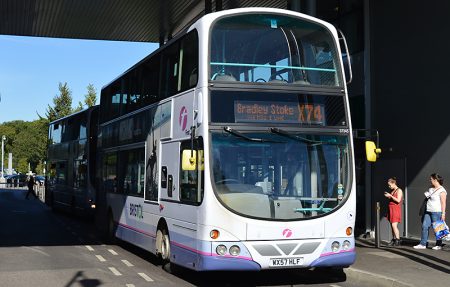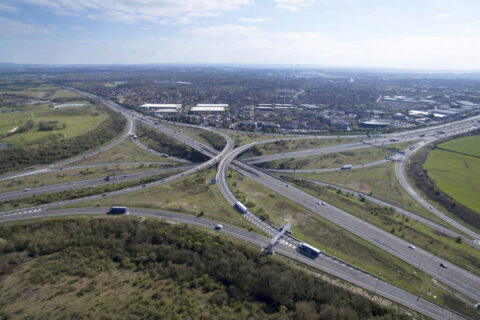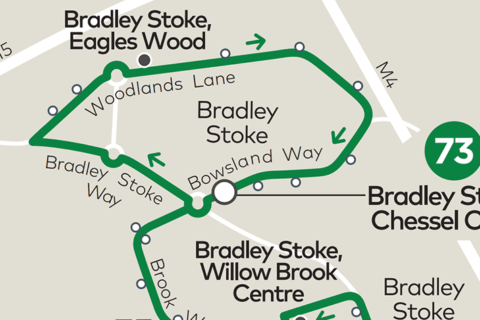Note: This article was originally published in the BSJ magazine on 3rd September, i.e. a day before the X74 service was withdrawn.
The X74 ‘express’ bus service linking Bradley Stoke with Bristol city centre, via the University of the West of England (UWE) and the M32, is being withdrawn from 4th September because the operator claims the number of passengers using the service makes it commercially unviable and South Gloucestershire Council (SGC) has decided against continuing to subsidise it.
It is just one of a number of services being withdrawn or reduced as a result of SGC reducing its annual bus subsidy spending by £155,690 (9 percent), compared to 2015/16.
Operator First West of England says it is unable to continue the X74 without local authority support because legislation prevents it running a fully-commercial service at a loss.
An announcement on the firm’s website says:
“Reflecting the lack of demand for direct journeys between Bradley Stoke and UWE, this service is being withdrawn and replaced instead by an express service between UWE and the city centre (service UWE).”
“While the decision to withdraw service X74 is regrettable, the majority of customers should be able to use other services to complete their journeys.”
“While difficult to digest if you are one of the few affected by this type of decision, the fact remains that we are a business, and we do have to make these tough choices to ensure the long term viability of the whole network. Where areas have been left without services, we did discuss these matters in advance with the relevant local authorities, giving them the opportunity to consider what alternatives may need to be put in their place.”
Speaking at a public meeting in Kingswood on 11th August, First’s local boss James Freeman said buses in his region had been “making very little money indeed” in recent years, having brought in 25 extra vehicles to ease reliability issues caused by increased traffic congestion. At the same time, the level of support from local authorities had “dwindled,” he added.
South Gloucestershire Green Party representative Richard Burton, who lives in Little Stoke, said SGC had the power to subsidise services where there is a social need, but is strapped for cash due to Government austerity measures. He claimed that, nationally, spending on road building is being maintained while spending on measures to promote buses, walking and cycling is being cut. The answer, he said, is to persuade the Government to divert money away from roads.
The vast majority of people at the meeting were there to voice concerns about cuts to services in the eastern fringe of Bristol, but one Bradley Stoke resident, Kelly Coles, spoke out about the “shockingly unreliable” 73 and X74 services, which had caused her to incur additional childcare costs because of delays getting home. She added that without the X74 it will now be very difficult to access UWE from Bradley Stoke. Another local resident, Mary Bowden, had to leave before the end of the meeting, but handed Mr Freeman a letter in which she expressed disappointment about the withdrawal of the X74 and commented about unreliability and long journey times on the 73.
A number of Journal readers have also commented on our website and Facebook page about how the withdrawal of the X74 will make it difficult for them to access the Filton campus of SGS College.
An SGC spokesperson said:
“The X74 was previously supported through the Local Sustainable Transport Funding (LSTF) to provide travel between Bradley Stoke and UWE as an enhancement to an existing service in the morning and afternoon peaks.”
“The aim was to develop routes which linked residential areas to areas of employment. The contract allowed for a period of support and a further period where it would continue to operate under contract but was funded by the operator on a commercial basis. The operator made a decision to operate the service all day and not just in the peaks on a commercial basis for the length of the contract.”
“Once the contract expired, the operator reviewed use to determine whether the service was going to be viable on a commercial basis. They came to the conclusion that the numbers using the service were such that it was not commercially viable to continue it.”
“As the council, through the LSTF program, had already supported this development program for two years, it was not in a position to use core funding for the service where it had been shown that it would not be sustainable.”
This article originally appeared in the September 2016 edition of the Bradley Stoke Journal news magazine, delivered FREE, EVERY MONTH, to 9,500 homes in Bradley Stoke, Little Stoke and Stoke Lodge. Phone 01454 300 400 to enquire about advertising or leaflet insertion.
Postscript (14/09/16)
Journal editor Stephen Horton writes: At the time the above article was written, I had assumed that a proportion of the (unquantified) LSTF money that had been used to subsidise the X74 service was included in the figures SGC had given us for its expenditure on ‘supported services’ during 2015/16 (£1,714,360; and forecast to reduce by 9 percent to £1,558,670 in 2016/17). However, I have since learned that the LSTF money is treated as a separate budget and is not included in the ‘supported services’ figures for any year.
An SGC spokesperson explained:
“The funding provided for the LSTF project was to enhance the service between UWE to Bradley Stoke, initially provided by Wessex [service 13], which was withdrawn when UWE terminated the contract.”
“The residual funding of that element of LSTF (£233,331) was used to support a replacement service delivered by First Bristol from August 2014 to April 2015. This was to continue to run the service albeit with an amended route to the end of the contract period.”
“But, as per the original contract, there was to be a year in which the service was operated but would not be funded. This was to encourage the operator to develop the service to be commercial.”
“The actual end date of the contract therefore was the end of March 2016. Up to this date the operator had to agree with the council any changes to the service.”
“The payment for this service was paid for from the LSTF budget and not from the council’s core funding and was thus separate from the annual Supported Bus Budget.”
• A petition (now closed) calling on SGC to “act to get Firstbus to revoke their decision to cancel the X74 bus service in Little Stoke” attracted 128 online signatures between 8th August 2016 and 8th September 2016.





I used catch the X74 from Braydon Avenue to Willow Brook shopping centre & Broadmead several times a week. It was often late & sometimes never turned up at all! It wasn’t busy but so useful, some passengers couldn’t walk more than a few yards. I don’t know why it ran on a half hourly basis or on Sundays, an hourly service Mon to Sat would be more than adequate, if it turns up. Now I drive to the shops or into Bristol. Public transport in Bristol is a disgrace and Metro Bus seems to be making things worse, roadworks everywhere and no benefits.
The current bus legislation does make it difficult to deliver service in England (not London) that is not commercially viable without support from the local council. Cross subsidies not being allowed, even if four routes make a profit together, but three of the four make a loss then all routes will be lost.
First West could have have addressed this by using
– less frequent service
– smaller single decker bus
– visit more bus stops in Bradley Stoke
Splitting the route into a several local buses and an express bus from BPW-UWE-Centre would have been viable.
@Simon, The possibility of using a smaller bus on threatened routes (in general) was raised at the Kingswood meeting, but James Freeman of First said the potential savings are negligible, really just a small amount on diesel, which they get very cheaply anyway.
Stephen, BSJ Editor
I appreciate that, but the capital cost of a 40 seat single deck bus against a 72 seat double deck bus must weigh into the equation, along with maintenance costs.
The popularity of the 73 against the x74 relates to the number of stops it visited. If the x74 had visited more that 3 stops in Bradley Stoke it may have been more popular